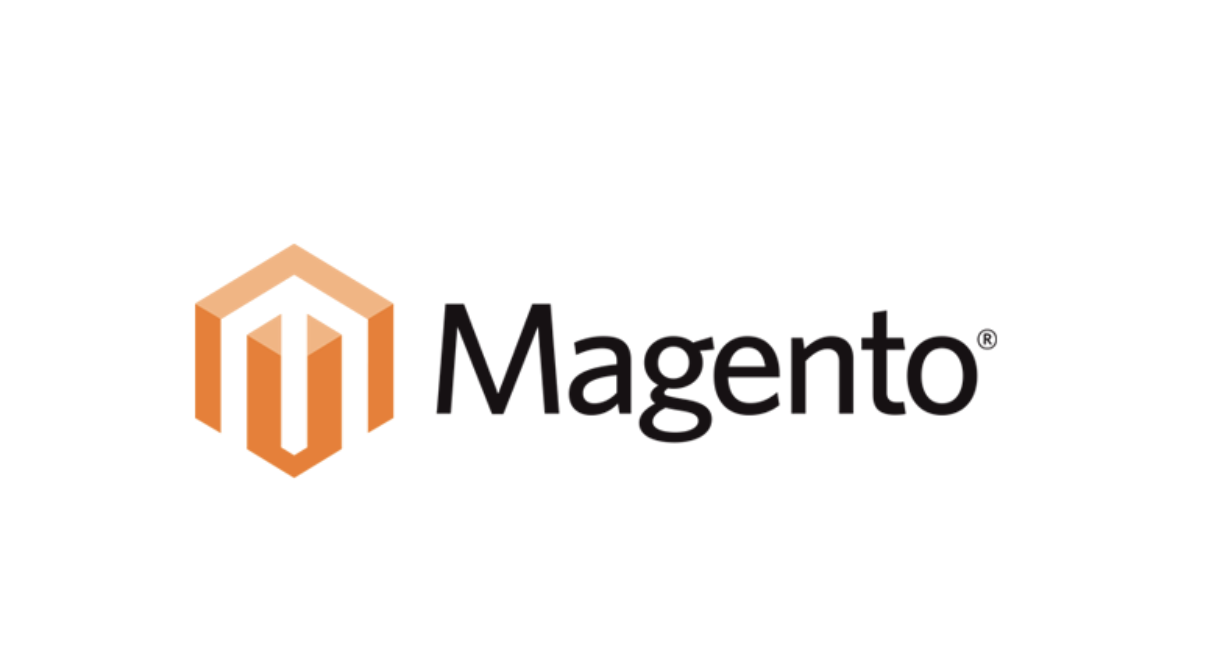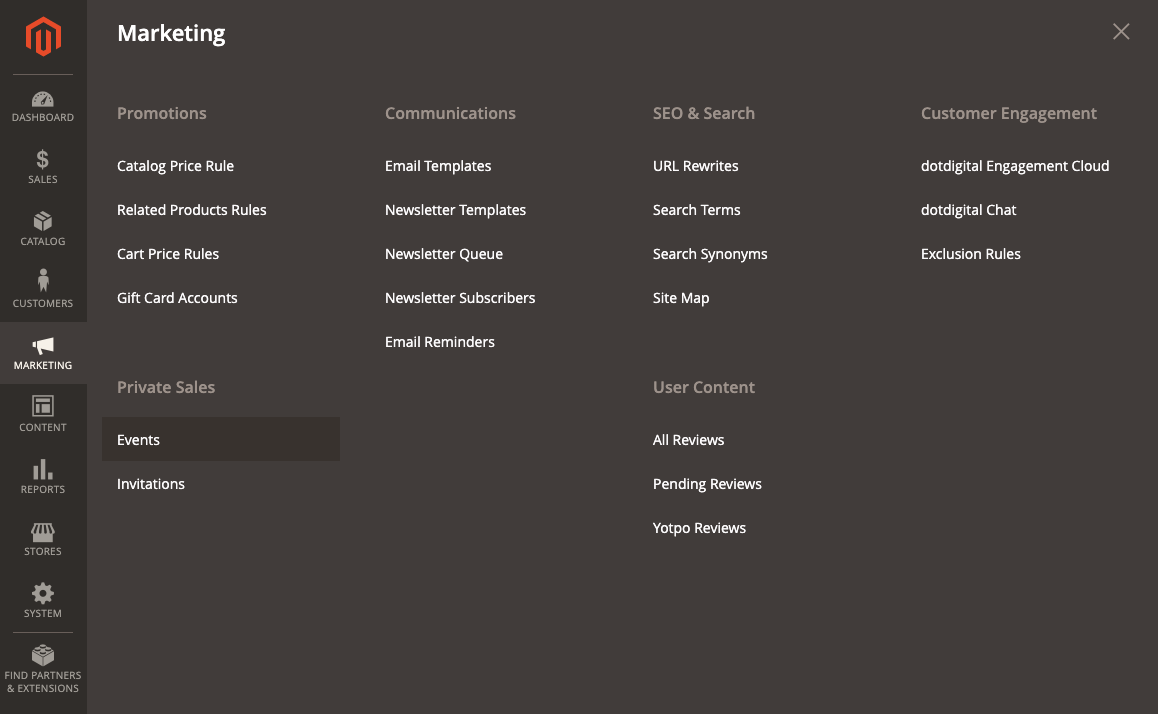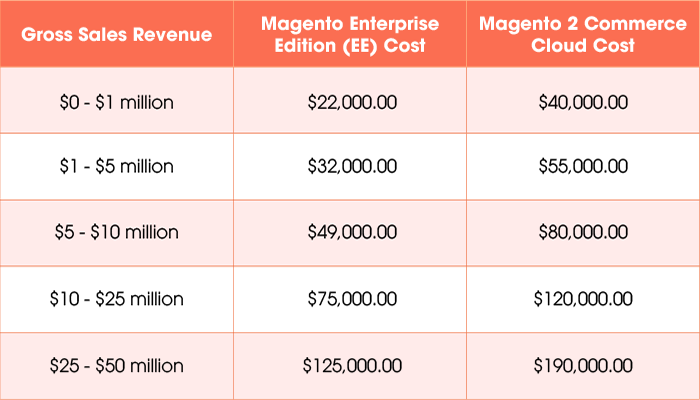Currently, there are plenty of well-built eCommerce platforms available for online merchants, and choosing the appropriate one can be problematic. After narrowing the list down, Magento and WordPress are two of the best-known players that are worth considering. These two platforms have been used by hundreds of thousands of companies, from small to large-scale businesses. But Magento vs WordPress, which one is better?
This blog post will help you select the right platform for your online store by comparing the difference between WordPress and Magento, giving you a clear understanding of both platforms, including critical features, scalability, SEO, Security, and so much more.
If you want to discover more options for alternatives to the Magento platform, you can have a look at other comparisons:
Magento vs WordPress: A Brief Overview
Table of Contents
Although Magento and WordPress are both acknowledged for their advanced features, which help to create and run eCommerce shops smoothly, they are different from each other to some extent, such as core purposes, target users, etc.
Magento
Magento is an open-source eCommerce platform that is formulated on Zend Framework and written in PHP. It was created in 2007 by Varien Inc. and made its official launch in March 2008 to assist merchants in creating their online stores. Since then, Magento has been trusted by plenty of world-famous businesses such as Aldo, Nestle, Forever New, ASUS, HP, Land Rover, and so on.
Now, there are approximately 750,000 virtual shops that have been built using this platform, and this number is assuredly increasing day by day on a global scale.
 As a powerful eCommerce platform, Magento has come in two distinctive editions: Magento Open Source and Magento Commerce.
As a powerful eCommerce platform, Magento has come in two distinctive editions: Magento Open Source and Magento Commerce.
- Magento Community Edition can be downloaded and used for free. Although this edition is free of charge, it has all the basic built-in features that a small business may need when setting up a simple webshop.
- Magento Enterprise Edition provides two plan options (with or without hosting) with much more exclusive features than the free one, such as Advanced Marketing Tools, Visual Merchandising, Streamlined Testing, PCI Compliance, Technical Support, and many more.
If you are still confused and do not know how to establish a website using Magento, seek help from our Magento website development services.
WordPress
WordPress is an open-source content management system that was released in 2003. In the beginning, it was supposed to be a blog-publishing system but then has developed to operate different types of web content such as eCommerce stores, membership sites, portfolios, etc. Up to 2021, there are more than 40% of websites are powered by WordPress.

WordPress offers two versions, WordPress.com and WordPress.org.
- WordPress.com has both free and paid plans. But if you do not pay the upgrade fees, there are many limitations, such as no eCommerce capabilities, no install plugins allowed, limited SEO control, etc.
- WordPress.org is self-hosted software that has unlimited features and all eCommerce capabilities.
To build an online store with WordPress, it is compulsory to download a plugin such as WooCommerce as WordPress is not a proper eCommerce platform. Check out our Magento vs WooCommerce article to delve into the difference between two platforms
Magento vs WordPress: A Comprehensive Comparison
Before choosing Magento or WordPress for eCommerce shops, let’s analyze these two platforms.
#1. Key Features and Functionalities
Key features and functionalities are the first things when considering Magento vs WordPress for eCommerce businesses. Although both platforms provide basic eCommerce features that all eCommerce shops need, there is no doubt that Magento still gains more prominence regarding usability and exclusive characteristics.
Magento offers numerous robust built-in features, which help businesses provide flawless experiences to their buyers with the ability to support shipping options and manage multiple storefronts, payment gateways, and language. It is worth mentioning these out-of-the-box features of Magento Enterprise Edition, such as Gift Registries, Advanced Catalog Search, Reward & Loyalty, Order and Inventory management, Rule-based Related Products, Email Management, and Private Sale Events, to name a few.
Moreover, besides targeting B2C companies, Magento Commerce is one of the most powerful platforms for B2B businesses, with outstanding functionalities including Company Accounts, Shared Catalogs, Company Credits, Requisitions lists, Quick Orders, Quotes, and a lot more.
Unlike Magento, WordPress offers various eCommerce features, but they are not built-in, so business owners have to install plugins, add-ons, and extensions separately. You can read this Magento 2 tutorial article to gain essential knowledge about Magento extensions.
#2. SEO & Marketing
To choose the best platform to implement your SEO and Marketing strategies, you should compare Magento vs WordPress’s SEO and Marketing features.
As one of the leading eCommerce platforms globally, Magento offers numerous default advanced SEO settings that help optimize its users’ store visibility on search engines, including Personalised URLs, Canonical tags, Google Tools 301 redirects, etc. Regarding Marketing, Magento provides exceptional built-in features in Promotions, Communications, User Content, Customer Engagement, SEO & Search, and Private Sales.

In contrast, WordPress’s users have to download plugins and extensions to have premium SEO and Marketing settings.
#3. Licenses & Pricing
Another key factor when deciding on Magento or WordPress is pricing. Although it will be the same fee for domain registration, the cost to pay plans, and install extensions, apps, and themes of Magento and WordPress is entirely different.
As mentioned before, Magento Open Source is free to download, while the fee to use Magento Enterprise Edition is based on your business’s annual gross merchandise value and average order value. The license costs $22,000 per year with Magento Commerce edition and is priced from $40,000 yearly with Cloud Edition. WordPress has one free plan and four paid plans, namely Personal, Premium, Business, and eCommerce, priced at $5, $10, $33, and $59 respectively per month if paid yearly.

In case you are still wondering about other Magento costs, check out this Magento website cost article from BSSCommerce
There is no doubt that Magento Commerce is more expensive than WordPress. Still, it is worth the money because the Magento Enterprise edition offers more premium functionalities that satisfy the needs of all eCommerce websites.
#4. Scalability
For enterprises that want to scale up, considering scalability is unignorable. Scalability refers to how effectively one eCommerce site works when having a huge inventory and high traffic volume, especially spiking traffic on special days like Black Friday or Cyber Monday sales. So, Magento vs WordPress: which one is more scalable?
Choosing Magento is completely suitable for business owners who plan to have faster growth and expansions, with many products in diverse categories and enormous numbers of visits. Magento has the capability to copy 50,000 visits per hour and has a first-rate inventory management system that can keep hundreds of thousands of items simultaneously. It has upgraded both client and server-side and a database to achieve the steadiness and extensibility that medium to large businesses need.
Moreover, with the help of Varnish Cache, Magento can reduce response times, and display near-instantly results for catalog browsing, which impacts the performance.
About WordPress, this platform is also highly scalable if you pay enough attention to the following factors: plugins, themes, server hardware, bot traffic, and the right hosting.
#5. Speed & Performance
Speed is a critical factor in satisfying user experience (70% of online customers will not go back to a website if they feel the website speed is slow), so considering Magento vs WordPress speed is necessary. It is hard to choose which one loads faster. Many elements affect the performance, including image size, theme design, number of applications, plugins, extensions, website hosting, etc.
#6. Security
It is compulsory to review Magento 2 vs WordPress security as security is an essential metric in eCommerce sites to avoid cybercrime. Magento Commerce already has built-in security features, while website owners who use Magento Open Source may need to download security extensions. Otherwise, if they do not want to use extensions, Magento does offer security patches that are updated regularly to avoid any potential risks. However this manual installation is quite complicated and requires coding, so website owners may need assistance from Magento agencies.
About WordPress, it allows users to download free or paid security plugins. Otherwise, WordPress also provides continuously upgrading security code to protect websites on its platform. However, WordPress is quite different from Magento because updates are not manual; WordPress comes with an auto-update structure. So when a new security patch is released, users can schedule automatic updates.
#7. Ease of Use
Another thing that needs to be compared between eCommerce Magento vs WordPress is the ease of use. In terms of user-friendly and intuitive, it seems that WordPress is more well-received by people who are not tech-savvy. Magento requires more complicated coding applications to build eCommerce sites. It tends to suit people with at least fundamental technical knowledge (coding skills) or medium to large businesses willing to outsource their website development process to Magento professional experts like BSSCommerce.
We have proven our reputation in the eCommerce field with remarkable achievements:
– 11+ years of working experience.
– 150,000 customers served.
– 90% customer return rate.
– 5-star rating on Trustpilot.
Let’s explore how BSSCommerce – a top-notch Magento development agency can build or customize your Magento store for unparalleled sales growth!
On the other hand, WordPress is made for beginners, which provides the easiest, most straightforward way for everyone, even newbies, to build, customize virtual stores, and edit content.
#8. Support
In Magento, two different editions have two distinctive levels of support. With Magento Open Source, users can only get technical instructions through official sources like the Magento Help Center, free community-based support forums like Magento Stack Exchange, or certified Magento partners and developers. Meanwhile, with Magento Commerce, users can seek specific assistance via live chat support or email with reliable staff.

Magento Support Forums
Like Magento Enterprise Edition, website owners who use WordPress’s Premium or Business plans can experience online chat support and trusted documentation if they have any questions or face any difficulties.
#9. Extensions and Plugins
Last but not least, evaluating Magento vs WordPress’s extensions and plugins is needed. Every platform has its limitations, and that is why plugins were born to fulfill this shortage. Thankfully, both Magento and WordPress have a wide range of third-party extensions and plugins, which can help broaden their eCommerce sites’ functionalities.
Through Magento Marketplace, users can discover nearly 4000 top-end extensions (both free and paid) divided into several categories, like Reporting & Analytics, Shipping & Fulfillment, Site Optimization, Content & Customizations, Payment & Security, and so much more. Before being listed on the Marketplace, every extension was under-reviewed to ensure high-quality technical and content. Moreover, users can use extensions from marketplaces of Magento’s authorized partners like BSSCommerce Magento extensions.

Magento Marketplace
Meanwhile, WordPress offers many more plugins in terms of quantity, with more than 58000 plugins available on the WordPress marketplace to integrate.
#10. B2B Features
Magento did release a Commerce version with some highlighted Magento 2 B2B features to support wholesalers who are planning to make online stores. You need to install B2B modules to have these features on your Commerce website:
- B2B Quote
- Shared Catalog
- Quick Order
- Company Account
- Requisition Lists
- Purchase Orders
According to Forrester, Magento is one of the biggest market leaders in the B2B eCommerce suite. Many big brands are using Magento to sharpen their business such as ASUS, HP, BAUHAUS, and so on.
Meanwhile, WordPress has been regarded as a platform for personal blogs and small websites. And WordPress itself doesn’t include critical B2B features when compared to Magento. To infuse your WordPress website with wholesale functionality, you would have to install multiple extensions.
Plus, BSSCommerce does provide B2B web development & migration services tailored to small-to-large enterprises. Let’s see what we can do for your B2B eCommerce business!
Conclusion: Which is better Magento or WordPress?
We have provided you with a quick comparison of two famous eCommerce platforms, Magento vs WordPress. In a nutshell, both these two have their strengths and weaknesses. So, is Magento better than WordPress? Which one should you use? The answer entirely depends on your business size, needs, as well as purposes. While Magento tends to be eCommerce-driven, WordPress is more likely for content management.
If you want to create a global-selling and fast-growing webshop that needs much customization with a huge inventory, Magento is the best solution with plenty of out-of-the-box eCommerce features. Otherwise, if you have a start-up or small business that requires a medium extent of scalability with minor premium eCommerce functionalities, want to focus more on being content-rich, and only have a limited amount of products, using WordPress is an excellent idea.



